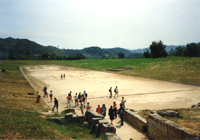August 1, 2008
Brief History of the Games
 |
|
The stadium at Olympia with the entrance in the foreground
|
The cradle of the Olympic Games is the sanctuary of Zeus, in ancient Olympia. According to Greek tradition, the first Games were established in 776 B.C., to honor the father of Gods and mortals. At the same time, the Olympic Games celebrated a newfound awareness of Greek nationality, that emerged after the collapse of the glorious Mycenaean kingdoms, around 1100 B.C. The demise of those kingdoms (which, by the way, were famous for such mythical sagas as the Trojan War), was followed by a 400-year period of poverty and stagnation, the so-called Dark Age. As Greece slowly came out of the Dark Age, the realization of belonging to the same nation gradually arose and found a proud expression in religious festivals. The most celebrated of those religious festivals were the Olympic Games.
Since their establishment and throughout antiquity, the Games were held every four years, until they were abolished by the Christian Emperors of the Byzantine Empire, in A.D. 394. Centuries later, at the end of the 19th century, the Games were revived by a group of Olympics enthusiasts, including Evangelos Zappas, Antonios Vikelas, and Baron Pierre de Coubertin. The first Modern Olympic Games were held in the Panathenaic Stadium of Athens, in 1896. Following the ancient tradition, they have been held every four years.
Events
In the beginning the games lasted only one day and comprised of one event, the running of one Stadion (approximately 180 meters). As years passed and the popularity of the Games grew, more events were added and in the Classical period (5th-4th centuries B.C.), the Games comprised 10 events and lasted for 5 days. The events were:
Importance of the Games
The Olympic Games are not only exciting sports events. Above and beyond providing an arena for noble competition, they are the most universal expression of peace and international cooperation. According to Greek tradition, the first Olympic Games were protected by a treaty, an Olympic Truce, between two powerful kings, Lykourgos of Sparta and Cleisthenes of Pisa, who agreed to cease all hostilities during the Games. For over a thousand years, the ancient Olympic Truce was kept alive by the dream of peace and the will to avoid armed confrontation. The idea of the Olympic Truce was revived in the Modern Games, but in the 20th century the international community did not succeed in making the dream a reality. At the dawn of the third millennium, in a period marked by war and violence, our society looks to the Games as a glimmer of hope for peace and international cooperation. Please join us as we salute the Beijing 2008 Olympic Games as a symbol of harmony, unity, and friendship.
Modern Digs, Ancient Finds: Archaeology and Olympic Construction in 2004
Greece is a country filled with ancient monuments and remains. The extensive construction that has been taking place in Greece for the building of the Olympic venues and for the necessary infrastructure for the Games, has brought to light an immense number of archaeological finds, that have fascinated scholars and the public alike. In order to inform the public, the AIA has collected information about Greek archaeology within the framework of Olympic construction.
For more about the ancient games, the Isolympic Games at Naples, and Beijing’s cultural heritage, see ARCHAEOLOGY’S Ancient Olympics Guide.
Notifications